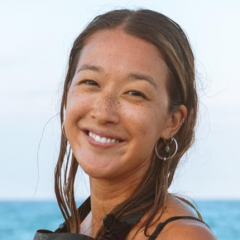Reflecting on Antarctica
Yolanda Waters, CBCS PhD candidate
It’s been almost two months since I returned from my trip to Antarctica. And in all honesty, it was an experience that I am still trying to process. But it’s safe to say I learned a lot. For example, navigating through an iceberg graveyard in Lemaire Passage, I learned about the wonder of icebergs and how each one is different and tells a story. Different lines, shapes and markings can tell you where they have broken or flipped, where air bubbles and salt have escaped, where the tide has reached. You can tell how old the ice is by the colour and the clarity. I still love my corals, but icebergs are now a close second favourite.
Reefs to icebergs
I also learned about climate impacts in Antarctica and saw many of them firsthand. We watched glacial calving in action and were told it was occurring at a rate faster than ever before. We saw swathes of red and green snow across the peninsula – snow algae it’s called – both serving as a visual indicator of warmer temperatures and accelerating snow melt. From unusually warm days to wild snowstorms, we listened to expedition guides as they told us how quickly weather patterns and animal behaviours were changing. I had never really had much appreciation for the southern continent before. But now I see Antarctica for what it is – an icon for ocean and climate (and human) health – it’s protection critical to maintaining a habitable planet. As someone who works on the Great Barrier Reef, another icon for ocean and climate health, the whole experience was moving, and I noticed a surprising amount of similarity between reef and Antarctic tourism and the potential for engaging visitors in environmental action.
But while on one hand it was an incredible experience – connecting with nature and making lifelong friends – with the trip came a lot of guilt and mixed emotions.
Work still to be done
The purpose of the expedition was to bring together a group of diverse citizens to develop a set of ocean-focused climate goals that we could put into action beyond the trip, the idea being that our collective experience of the Earth’s last wilderness would inspire deep and fruitful conversations. My role was to help facilitate discussion and guide these conversations towards tangible goals and resolutions.
But the trip was not what I expected. It turns out that when you put 100 people on a ship for 10 days, regardless of good intentions, it becomes immediately clear that not everyone is equal and that not every voice matters. In fact, in a very short amount of time the ship became a microcosm of the world – power structures and systems of oppression included.
Despite some incredible people being onboard, it was extremely disheartening to watch politics and agendas slow progress. To watch hierarchies form. To watch voices be actively silenced and ignored. We see
this happen on larger platforms often, but to see it happen on a boat full of people you’ve just shared an incredible experience with? It’s hard to find words.
Never has it been clearer to me that we will not be able to tackle the climate crisis without dismantling the oppressive systems that got us here in the first place; without also working towards a world where everyone is safe, heard and respected. And people and organisations rushing to join the climate space and get involved with solutions must be putting this front and centre – otherwise we will get nowhere. And watching the trip unfold made me realise just how much work still needs to be done.
Sharing the lessons
As a moderator, I found the whole process difficult and overwhelming (it made doing a PhD look easy in comparison). At this early stage in my research career, and as someone who often blurs the lines between research and advocacy, I am still learning to how to be an objective moderator while also ensuring the work adheres to my core values. The trip taught me that this is a skill that I need to work on – that is, how not to melt down when discussions become borderline harmful. It also taught me that even if you have the method worked out on paper (we had intended to follow a valid group elicitation method, common in social sciences and stakeholder engagement research), outside of a research setting, things can go rogue in an instant.
Though the final trip outputs are yet to be seen, the discussions I had with people onboard have inspired me to consider new ways in which I might champion ocean and climate goals. For example, how to contribute to the campaign against deep-sea mining, to urge ratification of the High Seas Treaty, to decarbonise marine transport, and so much more. I am lucky to be working with a team to incorporate these goals into a new campaign strategy for Divers for Climate, an initiative to engage the global dive community in climate solutions. I also hope to work some of my reflections on “real-world” stakeholder engagement and methodology into my PhD work, as well as integrate practical considerations about climate communication and Antarctic tourism in my overall discussion.
There are so many lessons to take away from this trip, and I am still working on a way to share these more deeply. Antarctica has changed my life in more ways than one, and I know that these lessons will shape my future and my career in ways I never expected. Though it was difficult at times, I could not be more grateful for the experience and for all who helped me get there – and how many people can say they’ve spent time with porpoising penguins and icebergs!
Image above: Yolanda gets close to the Antarctic wildlife. PHOTO: Yolanda Waters

